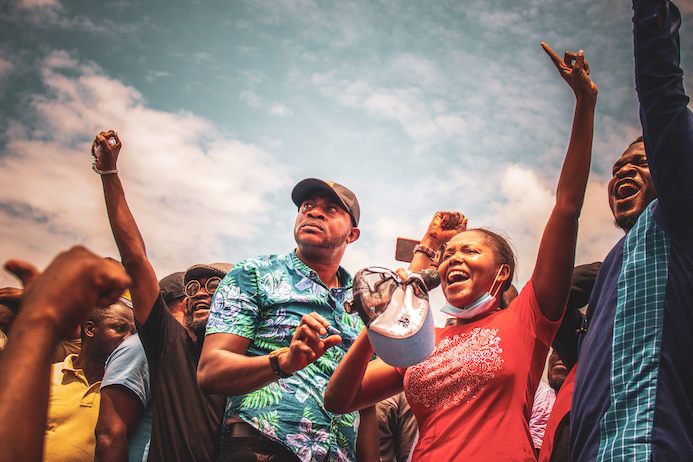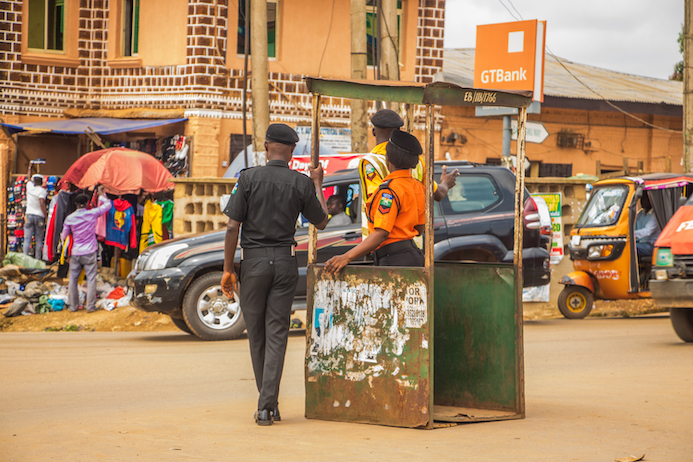The Platform
Latest Articles
by James Carlini
by Mohammad Ibrahim Fheili
by Nani Septianie and Albert Sibuea
by Humair Chaudhary
by Barshaneel Bora
by Jonathan Jung
by Ayesha Dawood
by Theo Casablanca
by Mohammad Ibrahim Fheili
by Sohail Mahmood
by James Carlini
by Mohammad Ibrahim Fheili
by Nani Septianie and Albert Sibuea
by Humair Chaudhary
by Barshaneel Bora
by Jonathan Jung
by Ayesha Dawood
by Theo Casablanca
by Mohammad Ibrahim Fheili
by Sohail Mahmood
The Enduring Scars of Police Brutality in Nigeria
Many Nigerians who took to the streets to demand an end to police brutality are likely never to see justice for the beatings and torture they endured.
In 2017, the sun’s relentless rays bore down on Lagos, a city alive with its usual frenzy of movement and commerce. Among the crowd was 25-year-old Adebanjo Abdulrahmon, who was on his way to the Imota area in Ikorodu, a town on the northeastern fringes of Lagos. Little did he know that this routine journey would mark the beginning of a harrowing ordeal.
As he made his way through the bustling streets, Adebanjo’s car was suddenly stopped by a group of police officers. They ordered everyone out of the vehicle, and what followed was a scene all too familiar to many Nigerians. The officers began interrogating the passengers, rifling through their belongings and the car itself.
“Suddenly,” Adebanjo recalls, “one of the officers reached into my pocket. When I questioned his actions, he slapped me before I could finish my sentence.”
The officer then snatched Adebanjo’s bag and began searching it. Upon finding his phone, he demanded that Adebanjo unlock it. When Adebanjo continued questioning what the officers wanted, they ordered the driver to leave, taking some passengers with him but leaving Adebanjo and two others behind.
At that moment, Adebanjo realized that his fate—and that of his fellow detainees—was precariously balanced between the whims of the armed officers and sheer luck. “They started beating us for reasons we couldn’t understand,” he says. “My phone was shattered in the process. We were detained for hours before they finally let us go.”

This encounter was Adebanjo’s first with the Special Anti-Robbery Squad, known as SARS. Formed in 1992, SARS was intended to combat armed robbery and other violent crimes in Nigeria. However, the agency soon became infamous for its brutality and human rights abuses, with its officers accused of committing the very crimes they were meant to prevent—extrajudicial killings, torture, arbitrary arrests, unlawful detention, extortion, and sexual violence.
But SARS is just a microcosm of the broader issues within the Nigerian police force. The entire institution has been plagued by deep-seated corruption. In 2019, a survey conducted by the Socio-Economic Rights and Accountability Project (SERAP) identified the Nigerian police as the most corrupt institution in the country.
The report revealed that 54 out of every 100 police interactions reported by citizens involved a bribe. “The police were the most adversely ranked on this indicator. For every 100 police interactions reported by respondents, a bribe was paid in 54 instances. The prevalence levels stood at 37% in the power sector, 18% in education, 17.7% in the judiciary, and 14% in the health sector,” the report noted.
“Fifty-one percent of the individuals who paid bribes to the police and 35 percent to the power sector believed this was the only way to access the services sought from these institutions.”
Adebanjo’s experience with SARS left an indelible mark on him. Since that day in 2017, he has been waiting for a chance to seek justice. So when the #EndSARS protests erupted three years later, in October 2020, Adebanjo was determined to join the movement, even if it meant risking his life.
On October 3, 2020, a video went viral showing SARS officers dragging two men out of a hotel in Ughelli, Delta State. The officers reportedly shot one of the men outside and fled with his vehicle, leaving him to die in agony by the roadside. This horrific incident ignited public outrage, especially on social media, where the hashtag #EndSARS quickly gained traction.
Despite a statement from Delta police authorities denying that the officers had shot the victim and claiming he was still alive, the movement only gained momentum. People across the country began sharing their own stories, photos, and videos of abuses by SARS officers.
A group of young Nigerians, led by social media influencer Rinu Oduala, decided to organize protests in Lagos beginning on October 7. Thousands of people across the country joined the demonstrations, which spread to major cities, including Abuja, Osogbo, Kano, Ibadan, and Port Harcourt.
For Adebanjo, the protests were not just about seeking justice for himself but also for others in his community who had suffered at the hands of SARS. “As a young person in Lagos, I had been victimized by police brutality on three separate occasions,” he recalls.
“The police in Lagos often disregard human dignity, targeting individuals who appear prosperous or drive nice cars. They conduct searches without probable cause, scrutinizing your person, phone, and devices. Failure to comply results in torture, contravening the Anti-Torture Act of 2017.”
“Furthermore, the Cybercrime Act of 2015 requires police to obtain a warrant before searching electronic devices, but these laws are frequently disregarded by the notorious SARS unit, who operate with impunity and disregard for the law.”

Adebanjo remembers that the demonstration in the streets of Imota began as a peaceful and crowded affair, with everyone united in their desire for a better society. However, the situation took a turn for the worse when a group of thugs gathered nearby and began gambling, drinking, and smoking, which eventually escalated into violence.
Gunshots were heard, and the once peaceful crowd in Imota scattered in all directions. The police, who had been strategically positioned, observing the scene, initially allowed the protest to continue. However, when violence erupted, it was the peaceful protesters who bore the brunt of the police response.
This pattern of events repeated itself across the country. From the second day of the demonstrations onward, unarmed civilians were met with brutal repression by security operatives. People were severely beaten, unlawfully arrested, and subjected to live ammunition and tear gas as security forces attempted to disperse crowds.
In response to the protests, the Nigerian authorities announced the disbandment of SARS on October 11, along with several promises of justice, accountability, and police reform. However, this was the fifth time since 2015 that such promises had been made, and the demonstrators were not satisfied with mere words. They continued demanding real change, but the government’s response was conciliatory. Nigerian security forces, particularly the army, unleashed a wave of violence on innocent civilians.
Adebanjo was fortunate enough to survive and tell his story. According to Amnesty International, at least 56 people were killed by security forces during the protests, victims of the excessive force used by the army and police.
The most tragic incident occurred at the Lekki Toll Gate on October 20, 2020. Situated along the Lekki-Epe expressway in Lagos, the toll gate became the site of a massacre. As the clock ticked past 6 p.m., the Nigerian army, in a bid to suppress the peaceful protests, opened fire on unarmed demonstrators, killing at least 12 people and injuring many others.
On that day alone, it was alleged that 38 people lost their lives across the nation. In a further attempt to stifle the movement, the government froze the bank accounts of individuals identified as protest leaders and sanctioned media houses that published footage of the shooting.
For example, Rachael Oduala Bolatito, a representative of the protesters on a judicial panel investigating the October 20 massacre, had her bank account frozen for 90 days following a court order.
In the aftermath of the Lekki Toll Gate shooting, many families were left grieving and searching for answers. Peace Okon, whose brother has been missing since the protest, is one such individual. Speaking to Human Rights Watch in 2021, she recounted her desperate search for her 18-year-old brother, whose last known location was the Lekki Toll Gate on that fateful day.
She fears her brother may have been shot or injured at the toll gate. Since then, she has visited numerous hospitals, mortuaries, police stations, and even a prison in Lagos in her search for him, but all her efforts have been in vain.
To make matters worse, Peace says that officers at the police stations and prison demanded bribes before offering any assistance. “I can’t report to anybody I know will do the right thing,” she laments. “My mom has developed high blood pressure. She calls me, weeping, asking for her son…I am helpless and responsible because I brought him to Lagos from our village. This country is not fair. There is no justice for the ordinary man. The government has forgotten about those who were killed or went missing at Lekki Toll Gate.”
Peace’s story is just one among many. Three years after the protests, justice remains elusive for those who were arrested. As of 2023, at least fifteen protesters detained in 2020 were still being held in arbitrary detention, most without trial, at Kirikiri Medium Correctional Centre and Ikoyi Medium Security Correctional Centre in Lagos, according to an investigation by Amnesty International.
Those in detention continue to suffer torture and other ill-treatment. Oluwole Isa, who was held at the Kirikiri Medium Correctional Centre, described his ordeal to Amnesty International, detailing the horrific torture he endured at the SARS facility in Ikeja.
“I was tied with a rope,” he said. “They bent me backward and tied my hands and legs together at my back. An iron rod was passed between my tied legs and hands. With the iron rod, I was suspended on an iron bar. Then they started beating me with a machete and wooden batons. They were forcing me to admit that I was involved in vandalism during the #EndSARS protests. When I could not bear the torture anymore, I told the inspector that I would confess. At that point, I was almost going to die. He brought me down; I still have the scar of the machete cut on my throat.”
Another detainee, Sodiq Adigun, who was arrested in October 2020 and previously held at the State Criminal Investigation Department in Panti, also shared his story with Amnesty International.
“Let the government release me,” he pleaded. “I have been detained since 2020 without trial. I am innocent. My life has been shattered. I need my liberty.”
In July, the Economic Community of West African States (ECOWAS) Court of Justice in Abuja ruled that Nigeria had violated the rights of its citizens during the #EndSARS protests. A panel of inquiry set up by the Lagos State Government found that at least 46 unarmed protesters were either shot dead, injured by bullets, or assaulted by security forces at the Lekki Toll Gate on October 20, 2020.
The court ordered the Nigerian government to pay $1,260 in compensation to each victim named in the suit—Obianuju Catherine Udeh, popularly known as DJ Switch, Perpetual Kamsi, and Dabiraoluwa Adeyinka.
However, no compensation can quench the burning anger of those who participated in the movement. October 2020 represents a dark chapter in Nigeria’s history—a time when young Nigerians, driven by a desire for change, were met with the full force of state violence. They carried nothing but the green-white-green flag of their nation, and they were murdered in cold blood. To this day, the question remains: Who gave the order?
Shereefdeen Ahmad is a journalist based in Nigeria with keen interest in sports, pro-freedom, education, fact-checking and investigations. Previously, Shereefdeen was Editor-in-Chief of The News Digest Press and a fellow at the Promoting Democratic Governance Reporting project, the Countering Misinformation and Promoting Media Literacy project and the Frontline Investigative Journalism Fellowship.